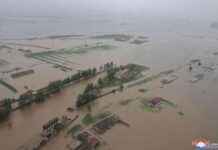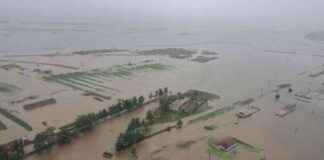Military Government in Myanmar Raises Electricity Rates to Fund Infrastructure Development
Amidst ongoing political unrest and economic challenges in Myanmar, the military government has announced a significant increase in electricity rates, effective September 1. The decision to raise electricity tariffs has sparked widespread concern among households and businesses in the country, as they brace themselves for higher utility bills in the coming months.
Reasons for the Rate Hike
The Ministry of Energy and Electricity, under the military-led government, justified the increase in electricity rates as a necessary step to generate additional revenue for the development of the country’s power infrastructure. Myanmar has long been plagued by frequent power outages and inadequate electricity supply, particularly in rural areas. The government aims to address these issues by investing in the construction of new power plants and upgrading existing facilities.
The new tariff structure will see residential consumers paying 50 kyats per unit for the first 50 units of electricity used, and 300 kyats per unit for consumption exceeding 200 units. Previously, the highest electricity rate stood at 125 kyats per unit, making the recent adjustment a substantial increase for many households. A resident in Yangon expressed his concerns, stating, “Our expenses are rising every day, but our income remains the same. The current electricity rates are already high for us, and I don’t know how we will survive with this increase.”
Impact on Businesses
Businesses in Myanmar are also bracing for the impact of the electricity rate hike, with varying rates based on consumption levels. Enterprises using up to 5,000 units of electricity per month will now pay 250 kyats per unit, up from the previous rate of 125 kyats. For consumption exceeding 5,000 units and up to 20,000 units, the rate will be raised to 400 kyats per unit, while usage exceeding 20,000 units will incur a charge of 500 kyats per unit.
This substantial increase in electricity costs for businesses is expected to have a ripple effect on the economy, leading to higher production costs and potentially inflationary pressures. Some business owners have expressed concerns about the impact on their bottom line, with one vegetable vendor in Yangon stating, “The increasing expenses are becoming a burden for us. I don’t know how we will cope with the rising costs of electricity and other utilities.”
Government’s Justification
The Ministry of Energy and Electricity has cited Article 41 of the Electricity Law, which grants the government the authority to adjust electricity tariffs with the approval of the ruling government. The additional revenue generated from the rate hike will be directed towards funding the construction of new power plants and enhancing the overall electricity infrastructure in Myanmar. The government aims to improve the reliability and stability of the power supply, particularly in areas prone to frequent outages.
Despite the government’s rationale for the rate increase, many citizens remain skeptical about the transparency and accountability of the military-led administration. The lack of public consultation and input in the decision-making process has raised concerns about the fairness of the new tariff structure and its impact on the most vulnerable segments of society.
Challenges in the Electricity Sector
Myanmar has been grappling with significant challenges in its electricity sector, including inadequate infrastructure, limited access to electricity in rural areas, and frequent power outages. The country’s power grid is strained, particularly during peak demand periods, leading to disruptions in electricity supply for both residential and commercial consumers.
In cities like Yangon, power cuts have become a common occurrence, with some areas experiencing outages lasting up to eight hours. The situation is even more dire in rural regions and remote areas, where access to electricity is limited, and power outages can persist for extended periods. The lack of reliable electricity supply hampers economic activities, hinders social development, and impacts the quality of life for many residents.
The government’s decision to raise electricity rates is part of a broader effort to address the underlying issues in the electricity sector and improve the overall reliability and efficiency of the power supply. By investing in new power generation capacity and upgrading existing infrastructure, the government aims to enhance energy security, promote economic growth, and meet the increasing demand for electricity in the country.
Public Reaction and Concerns
The announcement of the electricity rate hike has elicited mixed reactions from the public, with many expressing concerns about the impact on their household budgets and businesses. For low-income households and small businesses, the increase in electricity costs could pose a significant financial burden, further exacerbating their already precarious financial situation.
Critics of the government’s decision have questioned the transparency and fairness of the rate adjustment, highlighting the lack of public consultation and input in the decision-making process. The sudden and substantial increase in electricity tariffs has raised doubts about the government’s commitment to addressing the root causes of the electricity sector’s challenges and ensuring affordability and accessibility for all consumers.
Moving forward, it is essential for the government to engage in meaningful dialogue with stakeholders, including consumers, businesses, and civil society organizations, to address their concerns and seek constructive solutions to the challenges facing the electricity sector. Transparency, accountability, and inclusivity are crucial in building trust and confidence in the government’s energy policies and ensuring that the interests of all stakeholders are taken into account.
In conclusion, the increase in electricity rates by the military government in Myanmar reflects the country’s ongoing struggle to address the fundamental issues in its electricity sector and improve the reliability and accessibility of power supply. While the rate hike may generate much-needed revenue for infrastructure development, it is essential for the government to engage with the public, address concerns about affordability and fairness, and ensure that the benefits of the investment in the electricity sector are shared equitably among all segments of society.




















